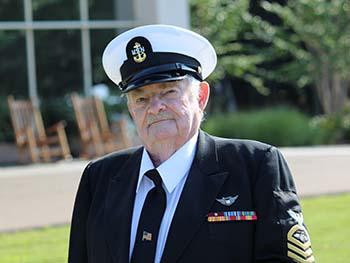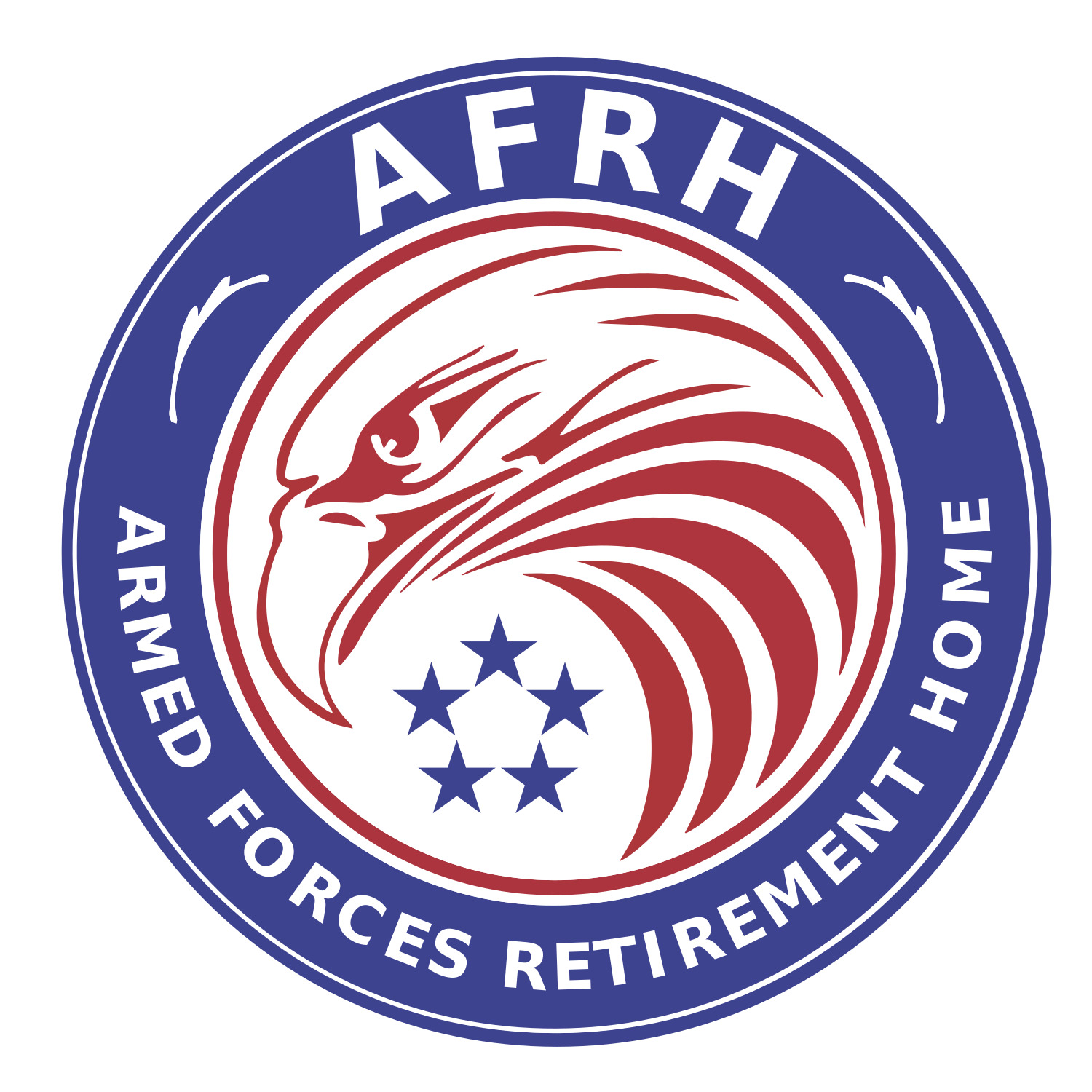
AFRH-G Veteran Highlight – William L. “Wild Bill” Allen
By Lori Kerns, AFRH-G Librarian
“Wild Bill” Allen grew up in St. Joseph, Missouri. His father, an English professor, and mother, a housewife, added to their family of four children by adopting Wild Bill from an orphanage. Growing up, some of his classmates poked fun at him for being adopted. He always gave the same reply to which they never had a comeback, which was, “When you were born, your parents didn’t have a choice but my mother looked down at me in the orphanage and chose me. I am a chosen one.”
The bombing of Pearl Harbor occurred when Wild Bill was a teenager. He was very angry at the situation and asked his father if he could join the military. Because he had always wanted to be a lighthouse keeper, he reasoned that being a sailor was the closest he was going to get. He entered with his adoption papers that stated he was 17 years old (only to find out five years later when he got his original birth certificate that he was a year younger than he always thought). At 16 years old he joined over 1,000 others to become a Houston Volunteer during WWII. He was sent to boot camp in San Diego, California in 1942. He trained to become a radioman, eventually transferring to aviation radioman.
His position brought him to LTA (lighter-than-air), aka blimp, school in Lakehurst, New Jersey to train as a radarman and radioman. He also operated MAD gear equipment to detect enemy submarines deep in the water. He began his hands-on experience when he was sent to an LTA base in Glynco, Georgia. Once his training was complete, he was sent to Brazil where his LTA joined a fleet of blimps to escort convoys of ships, which were usually destroyers.
Although the blimps were armed, their primary objective was to find submarines up to 90 miles away by radar. They would report their findings back to the destroyers for them to handle. Once the allied submarine forces in the Atlantic defeated the Germans, Wild Bill was transferred into a new field, HTAs (heavier-than airs), otherwise known as airplanes.
He was sent to aerial gunnery school to become a radioman gunner and graduated as a B-24 tail gunner. To qualify for this position, he had to jump off a 40-foot rig into a 12-foot pool. Since the war was still raging on, his squadron arrived in Miramar, California ready to fly to Tinian to begin dropping bombs. The morning their mission was scheduled, the skipper came out smiling and said, “Fella’, war’s over. You’re going home.” With no questions asked, Wild Bill was sent home.
During his three-year, six-month, 24-day stint in the military, the only skill Wild Bill had picked up was typing because it had been part of his Morse code training. He began working as a civilian contractor for the Army typing up discharges. He was out of the Navy for only five months when he decided he was ready to rejoin. Before long, the U.S. entered another conflict. However, Wild Bill had an entirely different duty than most forces involved in the Korean War. His mission led to him to Iceland where he was assigned to search for Russian submarines. Wild Bill served 22 years in the Navy. In 1964, he retired as a chief aviation electronics man. He finished his last two years as an aviation electronics instructor at Moffett Field, California. He is very proud that in his 22 years he never had one write-up, which earned him six good conduct medals, in addition to the European, American, and Asiatic Campaign Medals.
Upon retirement, Wild Bill decided to use his GI Bill to earn a degree in law enforcement. Using his degree, he began security and police work. He eventually became Chief of Police in Loganville, Georgia. He only served one year before he decided to step down from that position. In 1985, he decided to retire completely and move to Florida. He has been an “old, happy, rascal” ever since.
Living in Florida, he joined the Fleet Reserve Association (FRA) and became Secretary/Treasurer. One of the members of his branch went to visit the Naval Home in Gulfport and told him about it. In 2001, Wild Bill had just lost his third wife so he decided to try life at the Naval Home. It did not take him very long to get homesick. He moved out and went back to Florida to take back his FRA position. In 2005, he decided to give what was now AFRH-G another try. He was living in the home for less than a year when Hurricane Katrina struck. Instead of relocating to AFRH-W with the most of the other residents, he went back to Florida. He stayed until he received a letter stating that he would be welcomed back to AFRH-G when it reopened but would have to live at AFRH-W until that time came. He was flown back with the other residents for the reopening of their home and has been in Gulfport since.
Wild Bill is the proud father of four children. He has 12 grandchildren and three great-grandchildren. In November of 2016, he decided to tie the knot with his girlfriend, Jamie. Wild Bill cheekily says that he and Jamie “have decided not to have any children.” The couple spends time together at their Biloxi home when he is not living at AFRH-G where he volunteers as a tour guide, sponsor, and library aid. Wild Bill is very quick to tell anyone that he is proud to be a resident at AFRH. He tells every tour group that “this is the closest you or I will ever get to paradise on this earth.” In addition, he feels that the staff at both campuses of AFRH gives residents “an environment that is worthwhile to live in.” As for the nickname “Wild Bill,” good luck trying to find out how he got the moniker. He says it is a heavily-guarded secret.
- Log in to post comments
